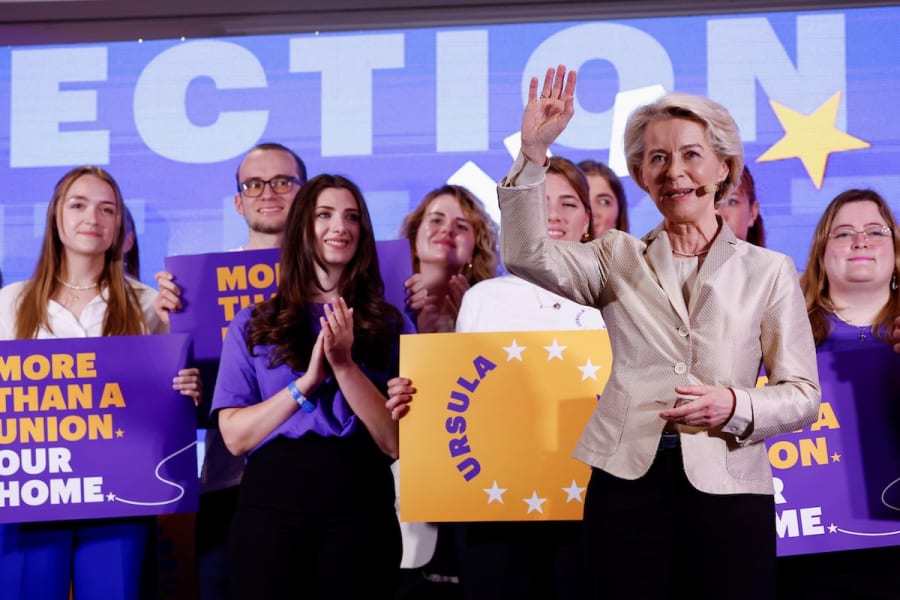New EU Parliament has 'potential of becoming more pro-Israel'

The European Coalition for Israel (ECI) believes the newly-elected European Union (EU) Parliament will adopt a friendlier stance toward the Jewish state following the recent EU elections held earlier in June.
In an interview with Belgian journalist Yossi Lempkowicz, ECI’s Founding Director Tomas Sandell noted that “the election result indicates that the new European Parliament has the potential of becoming more pro-Israel.”
Sandell’s assessment is based on ECI’s Israel Ranking 2024, released in April, about two months before the EU elections. The report evaluates the support for Israel among EU member states and political parties based on their voting records from 2019 to 2024.
The ranking revealed that the parties that gained more seats – European Conservatives and Reformists (+7), Identity & Democracy (+9) and European People’s Party (+14) – are also the most Israel-friendly in the European Parliament.
Conversely, the Greens and the Liberals, typically more anti-Israel, suffered losses (Greens -19 and Liberal Renew -22 seats).
The Spanish opposition party, Vox, topped the ECI vote for the most support for Israel, based on voting records over the last five years among the 196 national parties represented in the European Parliament. The left-wing parties from Spain, Belgium and Ireland were found to be the most critical of Israel.
This stance became most obvious last month during the declaration of support for a Palestinian state by the governments of Spain, Ireland and Norway on May 28, just ahead of the EU elections. Christian supporters of Israel in those nations branded this decision a reward for terrorism in light of the Oct. 7 Hamas attack on Israel.
The votes in the 27 EU member states in early June indicated a significant shift to the right on the political spectrum, with the Spanish government struggling to secure public support for its policies.
In France, the National Rally Party of Marine Le Pen won a massive 30% vote, causing President Emmanuel Macron to immediately dissolve the National Assembly and call for elections at the end of June.
In Germany, the far-right Alternative for Germany (AfD) Party took second place, and in Italy, Prime Minister Giorgia Meloni’s party received more than a quarter of the votes.
The prime ministers of Spain and Belgium suffered major losses, with Belgian Prime Minister Alexander De Croo resigning as a result. He had called for a review of the EU’s trade relations with Israel.
During his interview regarding the election results, Sandell noted that each far-right party should be considered individually.
“Instead of dismissing the far-right parties that made electoral gains, I think we should at least give them a chance and relate to them party by party, country by country and not generalize.”
He pointed out that “whereas there are reasons to be concerned by the radicalisation of Alternative for Germany (AfD), other far right parties – such as Brothers in Italy and Vox in Spain – seem to be moving more towards the mainstream.”
“Generally speaking, the results would indicate that there is a greater potential for a stronger pro-Israel caucus in the European Parliament,” Sandell added.
On Monday night, government leaders from the 27 EU member states met for a first consultation in Brussels, Belgium but without reaching any consensus on who should get the top positions in the new EU.
The main concern for Israel and her allies now is the upcoming appointment of a new High Representative for Foreign Affairs and Security Policy.
According to ECI, current EU High Representative Josep Borrell has “been campaigning openly against Israel in recent months, despite the objection of many leading EU member states.”
Sandell hopes Borrell's replacement will come from a Central Eastern European country, “since these leaders have a more realistic assessment of how to relate to totalitarian regimes like Russia or Iran, instead of hiding between a policy of appeasement."
"This would benefit both Israel and Ukraine,” he said.
The European Coalition for Israel is a grassroots movement, launched in Brussels in 2003 as “a coalition of all the others,” meaning “non-Jews who felt a moral obligation to stand up for the Jewish state and people in a time of threat,” according to its website.
ECI, which holds a monthly broadcast from the European Parliament, says the organization “seeks to inform political leaders in Brussels and other European capitals about the complex realities in the Middle East."

The All Israel News Staff is a team of journalists in Israel.













